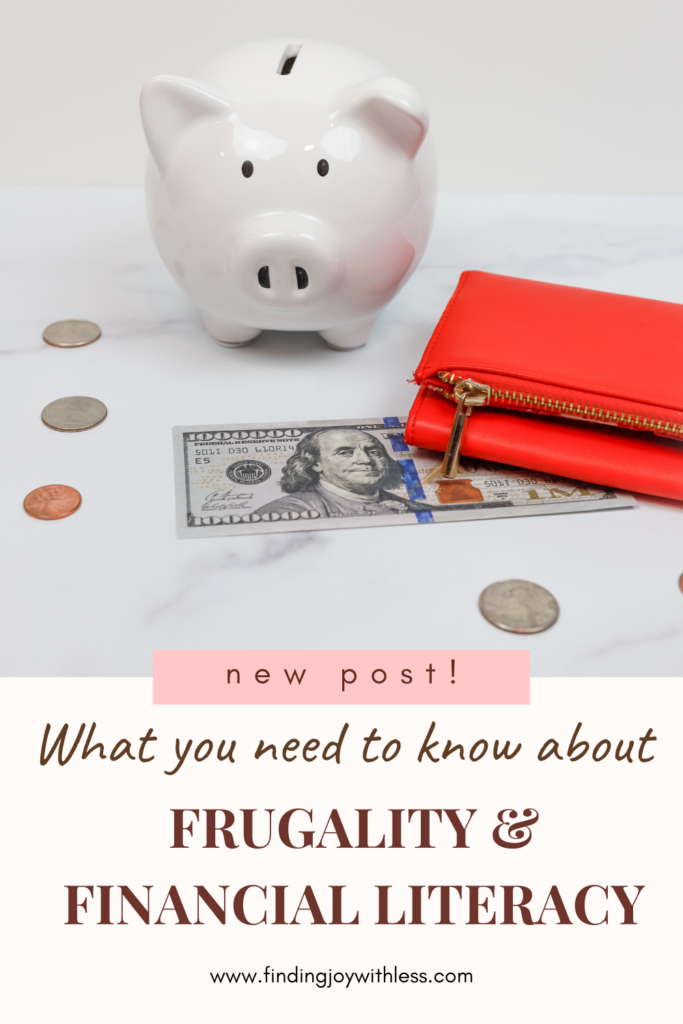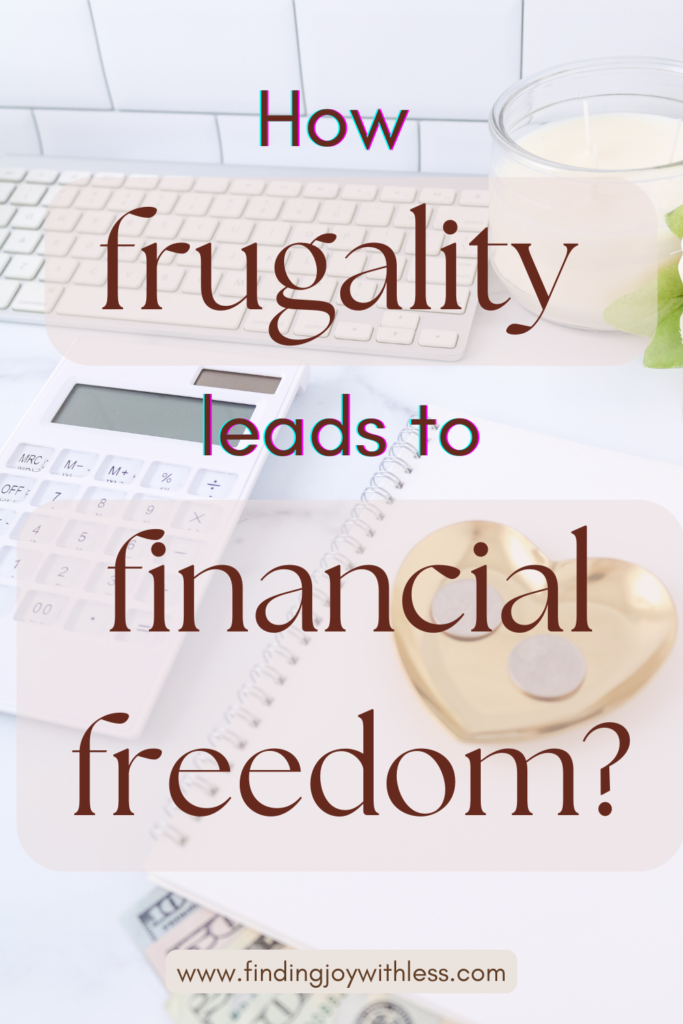Most people think being frugal means being cheap, which is not always the case. There are a lot of benefits to practicing frugality – especially when it comes to your financial health. When you learn to be frugal, you are essentially learning to be more mindful of your money. You know how to make the most of every penny, which can significantly impact your financial literacy. This blog post will discuss the link between frugality and financial literacy and show why it is so important to practice both!


What is the definition of Frugality?
“the quality or state of being frugal: careful management of material resources and especially money.”
Frugality according to Merriam-Webster.
Frugality is the quality of being frugal, sparing, thrifty, prudent or economical in using consumable resources such as food, time or money.
What Is Financial Literacy?
According to Investopedia:
Financial literacy is the knowledge and application of various financial skills. These may include creating a budget, understanding how credit works, and saving for retirement. Financial literacy includes understanding different financial instruments, such as stocks, bonds, and ETFs, and creating an investment plan.
Why Financial Literacy and Education is important, Investopedia.
It is the ability to understand and use financial concepts and make informed decisions about personal finances. The two terms are often used interchangeably, but they are different.
Frugality is a quality that can be exhibited in many aspects of life, not just when it comes to finances. On the other hand, financial literacy refers to knowledge about money and economic concepts. It is important to be both frugal and financially literate to make sound decisions about personal finances.


How does frugality lead to financial freedom?
1. Frugality can be a key to financial success
While there are no guarantees in life, one of the best ways to ensure financial success is to practice frugality. Frugality is the quality of being intentional with money or resources. In other words, it is the virtue of being able to make do with less. Frugal people know how to stretch their resources and make them last. They are careful not to waste money on unnecessary luxuries and instead focus on investing in essential items that will provide long-term value. People who live frugally often find that they can save more money than their counterparts, giving them a financial cushion for emergencies or unforeseen expenses. While frugal living requires some self-discipline, it is a proven path to financial success.
2. Frugal People are more likely to be financially literate
Although being frugal and financially literate is not the same, they are closely related. Those who are frugal are more likely to be financially literate because they have a better understanding of the value of money. This understanding often comes from experience, as those who have been through tough financial times are more likely to be frugal. As a result, they are less likely to make financial mistakes that can lead to debt or other problems. So, learning to be frugal is a good place to start if you want to achieve financial freedom.
3. Frugality teaches you how to make the most of your money
Frugality is often seen as a negative trait associated with stinginess and penny-pinching. It is just a matter of allocating our resources to the stuff we value most and letting go of some that do not. It can help you to become more independent and self-reliant and to take greater control of your finances. When you are frugal, you learn how to be creative and resourceful and find fulfilment in things that don’t cost much money. In a world where consumerism and materialism are prevalent, frugality can be a refreshing and empowering way of life. So next time you’re tempted to judge someone for being frugal, remember that this lifestyle has many positives. You may even decide to give it a try yourself.


4. Frugality helps you develop a better understanding of your spending habits
Most people are not aware of their spending habits. They mindlessly swipe their card or hand over cash without thinking about where the money is going. This can lead to financial problems down the road. By tracking our spending, we can better understand where our money is going and adjust our budget accordingly. This will help you save money in the long run and avoid financial problems. Tracking your spending can also help you identify any unwanted or unnecessary expenses to cut them out of your budget. Ultimately, developing a better understanding of your spending habits can lead to a healthier financial life.
Where your money goes is where your heart is.
5. Frugality can help you save money for essential things like retirement or a rainy day fund
One of the most critical lessons adults can learn is the value of frugality. Being mindful of your spending and making savvy financial choices can save money over time. This can be especially helpful when saving for important things like retirement or a rainy day fund. The key to being successful with frugality is to have a plan and stick to it. This means setting a budget and sticking to it, even when it means saying no to some purchases you would otherwise make. It can also mean making trade-offs, like driving an older car or eating out less often. But in the end, these sacrifices can pay off by giving you the financial security you need for the future.
6. Frugality can be passed down from one generation to the next.
It’s a way of life that teaches people how to live within their means and make responsible financial decisions. Frugal habits can be learned at any age, but they’re often instilled in children by their parents. By teaching our kids the value of money and how to save, we can set them up for a lifetime of financial success. And as frugality becomes more prevalent, it can ripple effect on the economy, helping to reduce debt and increase savings. In these ways, frugality is not just a personal virtue but a public good.
As an Amazon Associate, I may earn from qualifying purchases when you click on the links; at no additional cost. Please see the disclosure policy for more information.
Inspirational Stories of Frugal People who are now debt-free


In today’s world, it’s more important than ever to be frugal and financially literate. With the cost of living rising and the economy fluctuating, it’s essential to know how to manage your money.
For many people like myself, being frugal is a matter of necessity. But even if you’re not on a tight budget, there are still plenty of good reasons to be mindful of your spending.
From people who have managed to save up enough money to retire early to those who have found ways to live a frugal lifestyle and still enjoy their lives, there are plenty of examples of people who have achieved financial freedom through frugality.
Here are just a few of the most inspiring stories:
1. Lydia Senn
Watch how they had paid $36,000 in debt in two years living off one income.
Lydia Senn now writes about frugal living on her blog, Frugal Debt-Free Life. Lydia and her husband had student loans and bought a house before paying their debt. However, because of the recession, she lost her job, and they had to solely live off her husband’s income. She and her husband faced hardships during these times, adding more debt due to a car accident resulting in her having to go through a rough pregnancy. But they pulled it off with remarkable resilience by living frugally and paying off $36,000 in debt in two years.
2. Dyana Marie from Money Boss Mama
She paid over $27,000 in debt as a young single mom from 2016 to 2020 and now teaches single mommas to become money bosses.
3. Bola Sukonbi, Clever Girl Finance
Bola saved her first $100,000 in three years from her starting annual income of $54,000 before taxes with a mortgage and other living expenses.
What to take from this?
When it comes to financial literacy, there is no one-size-fits-all solution. However, a few basic tenets can help anyone become more frugal and financially literate.
First, it is vital to understand the difference between needs and wants. Needs are essential for survival, while wants are extras that can be cut from the budget if necessary.
Second, it is helpful to create a budget and stick to it. Tracking income and expenses can help to identify areas where money is needlessly wasted.
Finally, it is crucial to start saving for the future as early as possible. Even little money put away each month can add up over time. Lastly, always remember to give back. By following these tips, you can start on the path to financial literacy and enjoy the many benefits of frugality.
Please share this article with your friends and family members who could use financial help, and let us know how being frugal have changed your life in the comments below.
Save using Rakuten when you shop!









Very Helpful, this is great inspiration!
Pingback: 5 BEST FREE BUDGETING TOOLS FOR MOMS